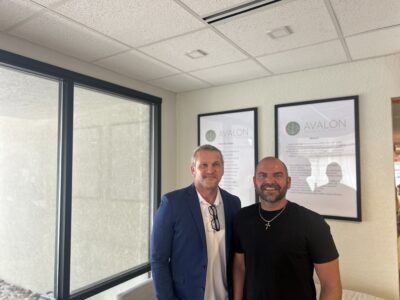Company wins $50 million grand prize in contest to slow global warming; its chief science officer is a Free State grad

photo by: Richard Drew/AP
XPRIZE Carbon Removal winners from Mati Carbon, Founder & CEO Shantanu Agarwal, left, and Chief Science Officer Jake Jordan, visit the trading floor of the New York Stock Exchange, Tuesday, April 22, 2025.
Back in the early 2000s Jake Jordan was doing what a lot of high school kids do — hanging out, participating in sports, feeling angst. In his case, though, the angst wasn’t about fitting in or being popular. It was about climate change.
“You can go to Free State High School and ask my guidance counselor: I was stressed about this when I was like 14 or 15 years old,” he said.
Fortunately, it’s a stress that has propelled, rather than crippled, Jordan, now 36, ever since.
On Wednesday, the company where he’s the chief science officer, Mati Carbon, won the $50 million grand prize in a global competition funded by Elon Musk’s foundation.
More than 1,300 teams from 88 countries participated in the four-year XPRIZE Carbon Removal competition, which began in 2021 to promote carbon-removal technologies. Carbon is believed to be a chief culprit in global warming, which is caused by the burning of fossil fuels that release carbon dioxide.
Mati Carbon’s prize-winning technology involves spreading crushed rock on farmers’ fields to help draw carbon dioxide from the atmosphere.
The method, called enhanced rock weathering, is fairly simple, as Jordan explained to The Associated Press: When it rains, water and carbon dioxide mix in the atmosphere, forming acid that breaks down rock. Carbon dioxide is converted to bicarbonate, which eventually is washed to the ocean, where it is stored for about 10,000 years instead of going back into the atmosphere.
Jordan’s company spreads powdered basalt rock — plentiful in many parts of the world — on farm fields “to speed up (rock weathering) that happens anyway,” Jordan told the AP. The powdered rock also releases nutrients that help rejuvenate soils and increase crop productivity.
Mati Carbon founder and CEO Shantanu Agarwal told the AP that this relatively low-cost approach “has a potential to really solve some planetary scale problems” while helping small farmers in countries like India who often bear the brunt of climate change, including extreme weather like droughts and floods that destroy crops.
What do they plan to do with the $50 million? Jordan told the Journal-World that they are “trying to get in front of as many small holder farmers as we possibly can” and to help them see the benefits of the technology.
By small holder farmers he means people who farm on just a few acres of land.
“There are hundreds of millions of small holder farmers that have basic climate insecurity because of changing weather,” he said. The idea is that “if everyone has skin in the game,” we have a far better chance in the fight against global warming.
Agarwal told the publication Tech Crunch that the small farms represent 800 to 900 million acres of farmland.
“You deploy that (land) into carbon removal,” he said, “you get more than a gigaton of removal every year while increasing income of these farmers who are extremely poor.”
After graduating from Free State High School in 2007, Jordan attended the University of Chicago, then the University of Texas in Austin, where he said he “got into the nitty-gritty of geosciences and trying to put geosciences into a quantitative framework.” He then went to Yale, where he said he “met a lot of people whose collaboration turned into this thing,” referring to his current occupation.
Jordan lives in St. Louis now, where his wife teaches at Washington University. That’s not too far from Lawrence, where his parents, Mary Anne and Luke Jordan, work at KU, but the Missouri address is more technical than anything, he said. Jordan spends more than half his time overseas, primarily in India and sub-Saharan Africa. On Thursday he spoke to the Journal-World from New York, where the prize was announced, after having just flown in from Bangalore in southern India. On Friday, though, he’s off again — this time to Vienna, where he’ll provide an update to interested parties on the farmers he’s been working with.
— This story incorporates reporting from Tammy Webber of The Associated Press.







